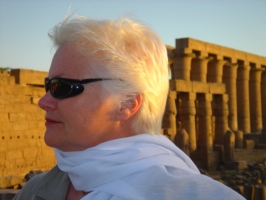 “Rejected suitors take to roaming as naturally as unhived bees.” It’s a phrase from English poet and novelist Thomas Hardy (1840-1938) and refers to Diggory Venn, perhaps my favorite of the Hardy characters.
“Rejected suitors take to roaming as naturally as unhived bees.” It’s a phrase from English poet and novelist Thomas Hardy (1840-1938) and refers to Diggory Venn, perhaps my favorite of the Hardy characters.
If the hive is Wessex (Hardy’s partly real, partly fictionalized Dorset county in south central England) and Venn the bee, then he does indeed take to roaming to become a red-hued nomad. Venn has been rejected by Thomasin Yeobright, who is told to pursue a more “professional” husband, and quits the world of dairy farming to become a wandering reddleman, a reddish powdery dye (“reddle”) used by sheep farmers to identify their flocks, and living in a small, horse-drawn camping trailer.
If Hardy, a native of Dorset, had joined me on my bus ride, he’d have still see exquisite, emerald-green hills strewn with popcorn dots of sheep. If he’d continued to rattle along with me through that country recently as I journeyed south, he would have enjoyed the sunshine in Weymouth, a seaside resort Hardy visited from time to time.
I also visited Dorchester to see the Hardy collection amongst the fossils and manufacturing memorabilia at the chock-a-block Dorset County Museum. That collection includes a recreation of Hardy’s study, complete with pens supposedly used to write his different rural soap operas, where tragic characters struggle against passion and social circumstance. It helped that, after viewing the museum, I enjoyed (wolfed down, more like it) a chutney-dotted ham-and-Stilton-infused ploughman’s lunch at The Old Tea House, where Hardy himself supposedly took tea numerous times.
 I took several buses during my time in Dorset–one to Lyme Regis and one to Dorchester–and had the opportunity to view the lusciousness of Dorset and east Devon scenery from my various windows. So incredibly lovely, with lines of trees like giant whip stitches defining farms and pasturelands.
I took several buses during my time in Dorset–one to Lyme Regis and one to Dorchester–and had the opportunity to view the lusciousness of Dorset and east Devon scenery from my various windows. So incredibly lovely, with lines of trees like giant whip stitches defining farms and pasturelands.
And, even though this unhived bee had wanted to see Hardy’s homes, old haunts, and the tearooms he frequented, it was the rolling hills and gorgeous countryside that really gave me the sense of the slow-paced agricultural village life that he both glorified and mourned.

Post a Comment